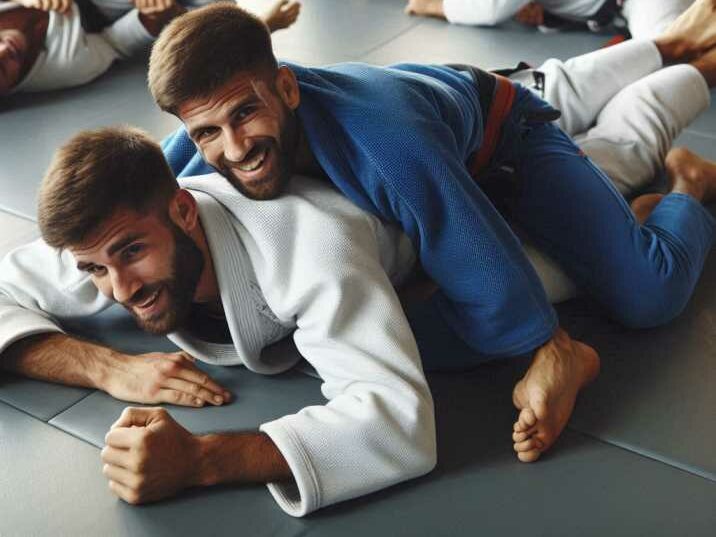Introduction
Table of Contents
In the world of martial arts, there are countless styles and disciplines, each with its own strengths and weaknesses. One such martial art that has gained immense popularity in recent years is Brazilian Jiu Jitsu (BJJ). But the question remains, is Brazilian Jiu Jitsu the best martial art? This article aims to explore this question by examining various aspects of BJJ, comparing it to other martial arts, and highlighting its unique features and benefits.

Table of Contents
- What is Brazilian Jiu Jitsu?
- History of Brazilian Jiu Jitsu
- Key Principles of Brazilian Jiu Jitsu
- Comparing Brazilian Jiu Jitsu to Other Martial Arts
- Brazilian Jiu Jitsu vs. Karate
- Brazilian Jiu Jitsu vs. Taekwondo
- Brazilian Jiu Jitsu vs. Judo
- Brazilian Jiu Jitsu vs. Muay Thai
- Benefits of Practicing Brazilian Jiu Jitsu
- Physical Benefits
- Mental Benefits
- Self-Defense Benefits
- Common Techniques in Brazilian Jiu Jitsu
- Brazilian Jiu Jitsu in Popular Culture
- Conclusion
- FAQs
What is Brazilian Jiu Jitsu?
Brazilian Jiu Jitsu is a martial art that focuses on grappling and ground fighting. It teaches practitioners how to control an opponent through various techniques such as joint locks and chokeholds. Unlike many other martial arts that emphasize striking, BJJ is all about leveraging one’s body to gain an advantage over a larger or stronger opponent.
History of Brazilian Jiu Jitsu
Brazilian Jiu Jitsu has its roots in traditional Japanese Jiu Jitsu. It was brought to Brazil by Mitsuyo Maeda, a Japanese judoka, in the early 20th century. Maeda taught the art to the Gracie family, who then refined and developed it into what we know today as Brazilian Jiu Jitsu. The Gracies are considered the founding family of BJJ and have played a crucial role in its global spread.
Key Principles of Brazilian Jiu Jitsu
Leverage and Technique
One of the core principles of BJJ is using leverage and technique rather than brute strength. This allows smaller individuals to effectively defend themselves against larger opponents.
Ground Control
BJJ places a significant emphasis on ground control. The goal is to take the fight to the ground, where practitioners can use various techniques to control and submit their opponents.
Submissions
Submissions are techniques used to force an opponent to give up. These include joint locks and chokeholds that can end a fight quickly and effectively.
Is Brazilian Jiu Jitsu the Best Martial Art?
Comparing Brazilian Jiu Jitsu to Other Martial Arts
Brazilian Jiu Jitsu vs. Karate
Karate is a traditional striking martial art that focuses on punches, kicks, and blocks. While Karate is effective for self-defense, it lacks the grappling aspect that BJJ excels in. BJJ’s ground fighting techniques can be particularly useful in real-life situations where fights often end up on the ground.
Brazilian Jiu Jitsu vs. Taekwondo
Taekwondo is known for its dynamic kicking techniques. However, like Karate, it lacks the grappling and ground control elements found in BJJ. This makes BJJ a more well-rounded martial art for self-defense purposes.
Brazilian Jiu Jitsu vs. Judo
Judo and BJJ share common roots and have many similarities, particularly in their use of throws and grappling techniques. However, Judo places more emphasis on throws, while BJJ focuses more on ground fighting and submissions.
Brazilian Jiu Jitsu vs. Muay Thai
Muay Thai is a striking martial art that uses punches, kicks, elbows, and knees. While it is highly effective in stand-up fighting, it does not cover ground fighting techniques. BJJ complements Muay Thai by providing skills necessary for grappling and submissions.
Benefits of Practicing Brazilian Jiu Jitsu
Physical Benefits
Practicing BJJ offers numerous physical benefits. It enhances cardiovascular health, builds strength, improves flexibility, and boosts overall fitness levels.
Mental Benefits
BJJ is not just a physical activity; it also has significant mental benefits. It helps reduce stress, improves focus, and builds discipline and resilience.
Self-Defense Benefits
One of the most practical benefits of BJJ is its effectiveness in self-defense situations. By focusing on grappling and ground control, practitioners can neutralize threats without relying on striking.
Common Techniques in Brazilian Jiu Jitsu
Here are some popular techniques in BJJ:
- Armbar: A joint lock targeting the elbow.
- Rear Naked Choke: A chokehold applied from behind an opponent.
- Triangle Choke: A chokehold using the legs to compress the opponent’s neck.
- Kimura: A shoulder lock technique.
- Guard: A position where one person uses their legs to control the opponent.

Brazilian Jiu Jitsu in Popular Culture
BJJ has gained widespread recognition, partly due to its prominence in mixed martial arts (MMA). Fighters like Royce Gracie have showcased the effectiveness of BJJ in the Ultimate Fighting Championship (UFC), bringing it into the mainstream.
Conclusion
While it’s difficult to definitively say if Brazilian Jiu Jitsu is the best martial art, it certainly stands out due to its unique focus on grappling and ground control. Whether you’re looking to improve your fitness, enhance your mental well-being, or learn self-defense, BJJ offers a comprehensive package that is hard to beat. If you’re intrigued by what you’ve read, consider trying out a class and experiencing the benefits for yourself.
FAQs
- Is Brazilian Jiu Jitsu good for beginners?
Yes, BJJ is beginner-friendly and many schools offer classes specifically designed for newcomers.
- How long does it take to get a black belt in Brazilian Jiu Jitsu?
On average, it takes about 10 years to earn a black belt in BJJ, but this can vary depending on the individual’s dedication and training frequency.
- Is Brazilian Jiu Jitsu effective in real-life self-defense?
Absolutely. BJJ is highly effective in self-defense situations, especially in close combat scenarios.
- Can Brazilian Jiu Jitsu help with weight loss?
Yes, regular practice of BJJ can contribute to weight loss due to its intense physical demands.
- Do you need to be strong to practice Brazilian Jiu Jitsu?
No, BJJ emphasizes technique over strength, making it accessible to people of all sizes and fitness levels.


